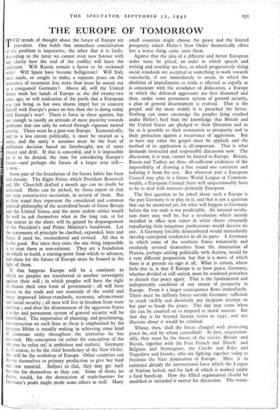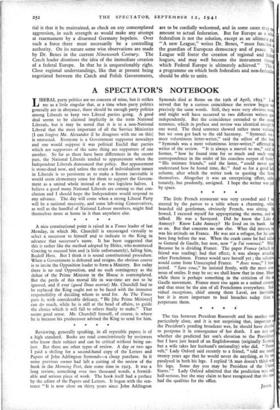THE EUROPE OF TOMORROW
r WO trends of thought about the future of Europe are 1. prevalent. One holds that immediate consideration of the problem is imperative, the other that it is futile. According to the latter we cannot even now foresee with any clarity how the end of the conflict will leave the continent. Will Russia remain a factor to be reckoned with? Will Spain have become belligerent? Will Italy have made, or sought to make, a separate peace on the assurance of treatment less stern than must be meted out to a conquered Germany? Above all, will the United States wash her hands of Europe as she did twenty-two years ago, or will realisation of the perils that a European war can bring to her own shores impel her to concern herself with Europe's peace no less than she is doing today with Europe's war? There is force in these queries, but not enough to justify an attitude of mere passivity towards problems that can only be solved through vigorous mental activity. There must be a post-war Europe. Economically, and to a less extent politically, it must be treated as a unity, and the unity it assumes must be the fruit of deliberate decision based on forethought, not of mere chance and drift. If that is conceded, and it is impossible for it to be denied, the time for considering Europe's future—and perhaps the future of a larger area stin- ts now.
Some part of the foundation of the future fabric has been laid already. The Eight Points which President Roosevelt and Mr. Churchill drafted a month ago can no doubt be criticised. Holes can be picked, by those expert in that not very constructive recreation, in several of them. But as they stand they represent the considered and common political philosophy of the accredited heads of Great Britain and the United States, and the more ardent critics would do well to ask themselves what in the long run, or for that matter in the short, will be gained by disparagement of the President's and Prime Minister's handiwork. Let the statements of principle be clarified, expanded, here and there, if need be, reconsidered and revised. All that is to the good. But since they exist, the one thing impossible is to treat them as non-existent. They are a foundation on which to build, a starting-point from which to advance, and plans for the future of Europe must be framed in the light of them.
If that happens Europe will be a continent in which no peoples are transferred to another sovereignty against their will ; in which peoples will have the right to choose their own form of government ; all will have access to the trade and raw materials of the world and enjoy improved labour-standards, economic advancement and social security ; all men will live in freedom from want and fear ; and after the disarmament of the aggressor States a wider and permanent system of general security will be established. The importance of planning, and proclaiming, reconstruction on such lines as these is emphasised by the progress Hitler is steadily making in achieving some kind of economic unity throughout the territories he has enslaved. His conception (or rather the conception of the advisers he relies on) is ambitious and realistic. Germany is, of course, to be the chief beneficiary of the New Order. She will be the workshop of Europe. Other countries can devote themselves to primary production to give her food and raw material. Subject to that, they may get such benefits for themselves as they can. Some of them, no doubt, would, for the destruction of trade-barriers for Germany's profit might profit some others as well. Many small countries might choose the peace and the limited prosperity which Hitler's New Order theoretically offers lest a worse thing come unto them.
Against that the idea of d.different and better European order must be pitted, an order in which speech and writing and worship are free, in which progressively rising social standards are accepted as something to work towards ceaselessly, if not immediately to attain, in which the abolition of impediments to trade is effected as rapidly as is consonant with the avoidance of dislocation, a Europe in which the defeated aggressors are first disarmed and then, under some permanent system of general security, a plan of general disarmament is evolved. That is the gospel, and the more widely it is preached the better. Nothing can more encourage the peoples lying crushed under Hitler's heel than the knowledge that Britain and the United States are pledged to their liberation and so far as is possible to their restoration to prosperity and to their protection against a recurrence of aggression. But to have any value the gospel must be applied, and the method of its application is all-important. That is what demands instructed and responsible discussion now. The discussion, it is true, cannot be limited to Europe. Britain, Russia and Turkey are three all-sufficient evidences of the impossibility of drawing a line round one continent and isolating it from the rest. But whatever part a European Council may play in a future World League or Common- wealth, a European Council there will unquestionably have to be to deal with interests primarily European.
The first question to be asked about such a Europe is the part Germany is to play in it, and that is not a question that can be answered yet, for what will happen to Germany before the war ends is not predictable. An internal revolu- tion there may well be, but a revolution which merely installed in office new rulers in white sheets virtuously repudiating their iniquitous predecessors would deceive no one. A Germany forcibly dismembered would immediately develop centripetal tendencies in all its parts. A Germany in which some of the southern States voluntarily and resolutely severed themselves from the domination of Prussia, perhaps uniting politically with Austria, would be a very different proposition, but that is a move of which there is at present no sign at all. What is certain, where little else is, is that if Europe is to have peace, Germany, whether divided or still united, must be rendered powerless to disturb that peace again. That is the fundamental and indispensable condition of any return of prosperity to Europe. From it a larger consequence flows immediately. There must be military forces outside Germany sufficient to crush swiftly and decisively any incipient attempt on her part to break the peace. The day may come when she can be counted on to respond to moral suasion. But that day is far beyond human vision in 1941, and any illusions about it would be criminal.
Whose, then, shall the forces charged with protecting peace be, and by whom controlled? At first, unquestion- ably, they must be the forces of the victors, Britain and Russia, together with the Free French and Dutch and Belgians and Norwegians, the Czechs and Poles and Yugoslays and Greeks, who are fighting together today to frustrate the Nazi domination of Europe. Here is in existence already the international force which the League of Nations lacked, and for lack of which it worked under a fatal handicap. How the Allied organisation should be modified or extended is matter for discussion. The essen- tial is that it be maintained, as check on any contemplated aggression, in such strength as would make any attempt at rearmament by a disarmed Germany hopeless. Over such a force there must necessarily be a controlling authority. On its nature some wise observations are made by Dr. Benes in the current Nineteenth Century. The Czech leader dismisses the idea of the immediate creation of a federal Europe. In that he is unquestionably right. Close regional understandings, like that at present being negotiated between the Czech and Polish Governments, are to be cordially welcomed, and in some cases they amount to actual federation. But for Europe as a wh federalism is not the solution, except as an ultimate g "A new League," writes Dr. Benes, "must function the guardian of European democracy and of peace. League will foster the creation of regional and fed leagues, and may well become the instrument thro which Federal Europe is ultimately achieved." This a programme on which both federalists and non-feder should be able to unite.



























 Previous page
Previous page